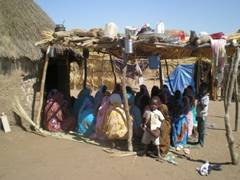- Home
- Technical Cooperation Projects
- Index of Countries
- Africa
- Sudan
- Capacity Development Project for Provision of the Services for Basic Human Needs in Kassala
- Project News
- Survey on Rural Health Facilities in Wad El Helew Locality (2)
Project News
2012-04-01
Survey on Rural Health Facilities in Wad El Helew Locality (2)
 Literacy Class of Mothers Group
Literacy Class of Mothers Group
According to the existing data, there are 18 rural health facilities (Basic Heath Units and Health Centers) in Wad El Helew (WEH) Locality excluding the ones in the refugee camps, but the survey team found only 14 functioning ones. Some facilities are recently closed or opened. Main reason for closing or opening of the facilities is the absence or arrival of health staff.
The health staff of the rural health facilities is assigned by Kassala State Ministry of Health, and the staff tends not wanting to be stationed in the remote villages. Even after the arrival, the staff may find there is no house for them to stay, nor is there a market for food. Sometimes, communication barriers may exist between the villagers and the staff, due to the differences of local language or tribal identity. The situation of staffing is thus complicated.
One Basic Health Unit, according to the standards set by the Federal Ministry of Health, is supposed to cover the minimum of 5,000 in population, or 5 kilometers in distance. In case of WEH, the population coverage is less than 5,000 in average, but the survey team found there are some villages which do not have any health facilities within 5 kilometers. Such standards, however, seem less important as indicators of availability of services, as the quality of service by these existing facilities is poor. Even where there is the facility, the staff may not be found there. In some, even simple and basic equipments such as thermometer, weighing scale, and stethoscope are not found or found out-of-order. The basic medicine is scarce, and the supposed-to-be-free-medicine for malaria is run out.
The survey team found that the average number of outpatients visiting the facility per day is ten, as registered in the notebook. Many of them are diagnosed as malaria. In case of emergency, the villagers may contact the health staff, and the patients are often sent to the nearest town. The patients of the remote village, far from the town, furthest in the border areas, as far as 6-8 hours by a car, where the public buses, if available at all, run only once a day, would wait till the last moment.
The survey team conducted the focus-group discussion with the mothers group. Over one hundred mothers in the age ranges of 20 to 60 participated. The average number of children was 5, although if you include the children who did not survive, the average may be a little higher. The most serious problem is anemia, they say. Food is not available due to the poverty and that is the cause for the anemia, they say. Other serious issues which they want urgent attentions are the issue of transportation, high cost for the treatment, insufficiency of quality health services, and the traditional belief and customs, etc. How brave they are. I was deeply impressed by the fact that they are still giving many births in such difficult circumstance.
(Reported by Ms. Atsuko Tsuruta, JICA Expert on Rural Health/Community Development)
- About JICA
- News & Features
- Countries & Regions
- Our Work
- Thematic Issues
- Types of Assistance
- Partnerships with Other Development Partners
- Climate Change / Environmental and Social Considerations
- Evaluations
- Compliance and Anti-corruption
- Science and Technology Cooperation on Global Issues
- Research
- JICA Development Studies Program / JICA Chair
- Support for the Acceptance of Foreign HRs / Multicultural and Inclusive Community
- Publications
- Investor Relations
